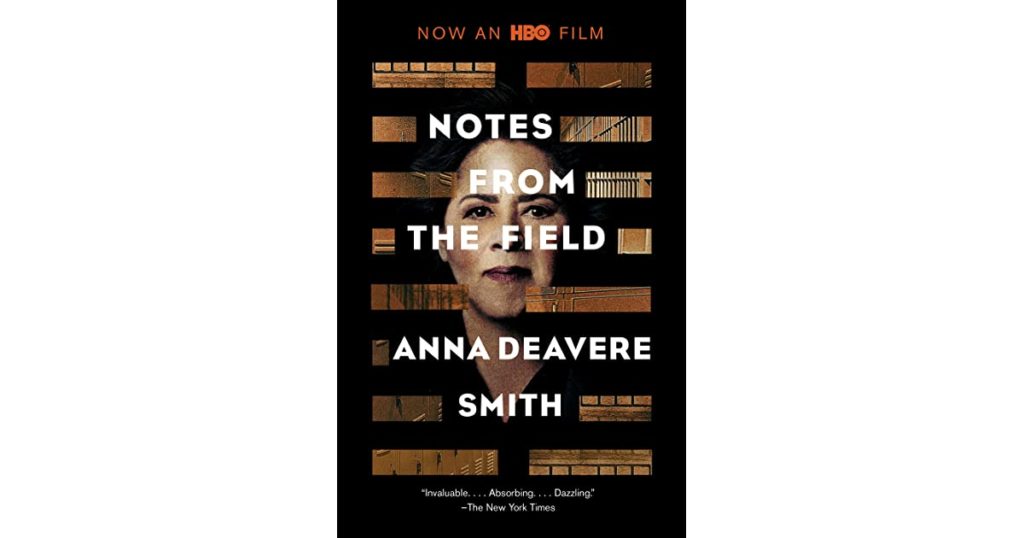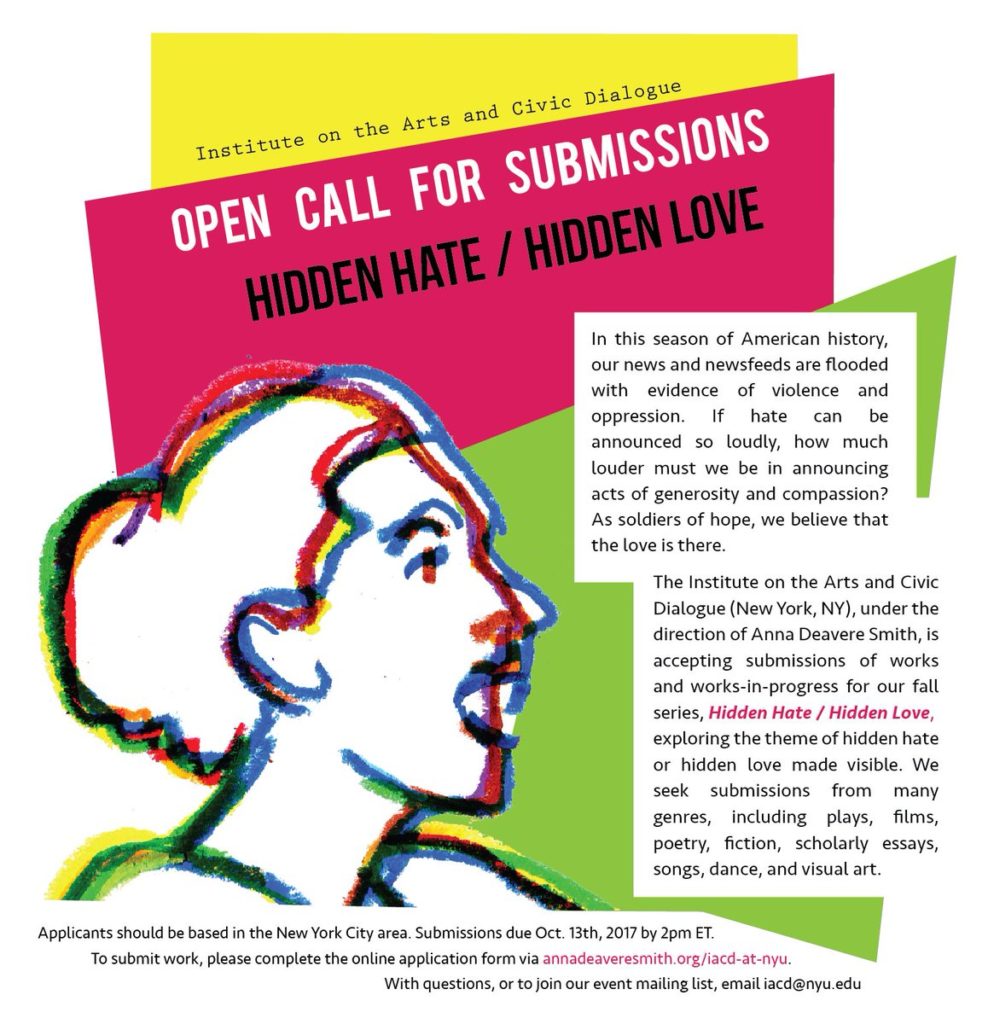In the autumn of 2017, we sat down in Los Angeles for an interview with the brilliant artist Anna Deavere Smith to talk about Notes from the Field, race in America, and reasons for hope in turbulent times. Her wisdom, grace and prescience are astounding – her words are as relevant today as they were the day we spoke almost three years ago. Here are her essential and timeless insights on the beating heart of America, and the essence of the American spirit.
Anna Deavere Smith
Anna Deavere Smith needs no introduction. Even those with only a passing knowledge of American culture know that she is a wildly talented playwright, actress, professor and journalist.
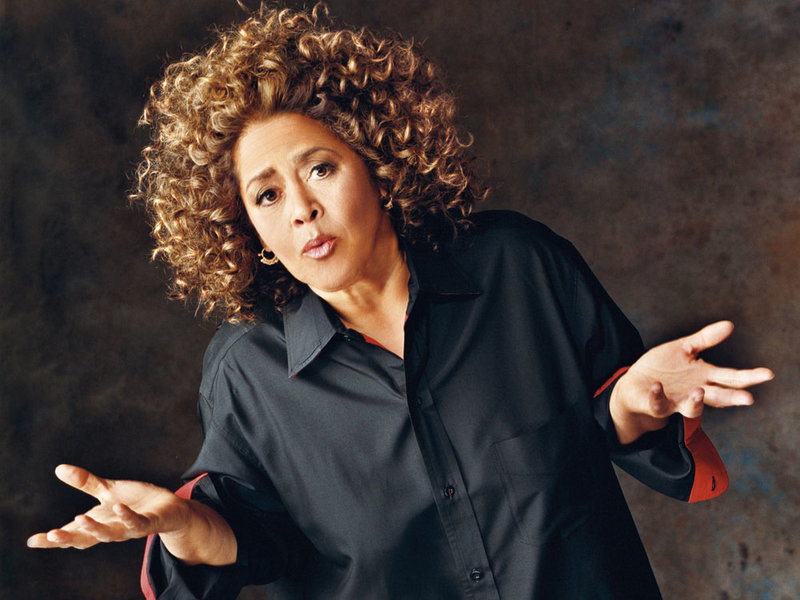
Our interview with the artist Anna Deavere Smith on race in America. Photo Credit: NPR.
She has delivered riveting theatrical performances in her ground-breaking one-woman plays, including Fires in the Mirror: Crown Heights, Brooklyn, and Other Identities; and Twilight: Los Angeles, 1992. All were shaped from stories she elicited through recorded interviews, which she then personally portrayed on stage.
Join our community
For access to insider ideas and information on the world of luxury, sign up for our Dandelion Chandelier newsletter. And see luxury in a new light.
We’ve seen her in film and on television in so many different and memorable roles. As a trusted counselor to the American President on The West Wing; as a hip grandmother on Black-ish; and as a nursing manager on Nurse Jackie (note that she is often cast as a woman of strength, wisdom and purpose).
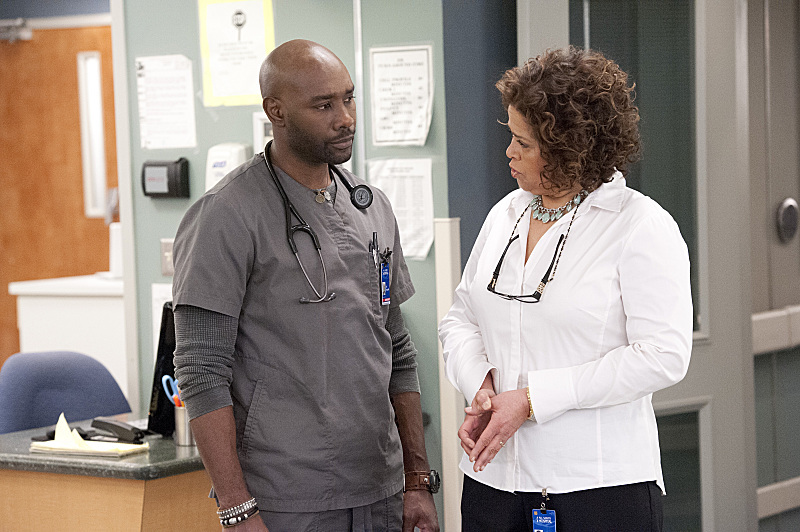
Morris Chestnut as Dr. Ike Prentiss and Anna Deavere Smith as Gloria Akalitus in Nurse Jackie. Photo Credit: David M. Russell/SHOWTIME.
Anna has served as a professor at Stanford and New York University. She is the recipient of a MacArthur Fellowship “genius” grant; a National Humanities Medal, which she received from President Barack Obama; and a George Polk Career Award, one of the top awards in journalism. She has been lauded for decades for her portrayal of authentic American voices.
Notes from the Field
Anna’s latest work is Notes from the Field, a one-woman play focused on the lack of opportunity and resources for young Americans living in poverty, and how those circumstances often lead them to incarceration in the criminal justice system.
It’s a more personal topic than usual – Anna is a native of Baltimore, and the death of Freddy Gray there, while in police custody, is one of the stories that she assesses and shares in the piece.
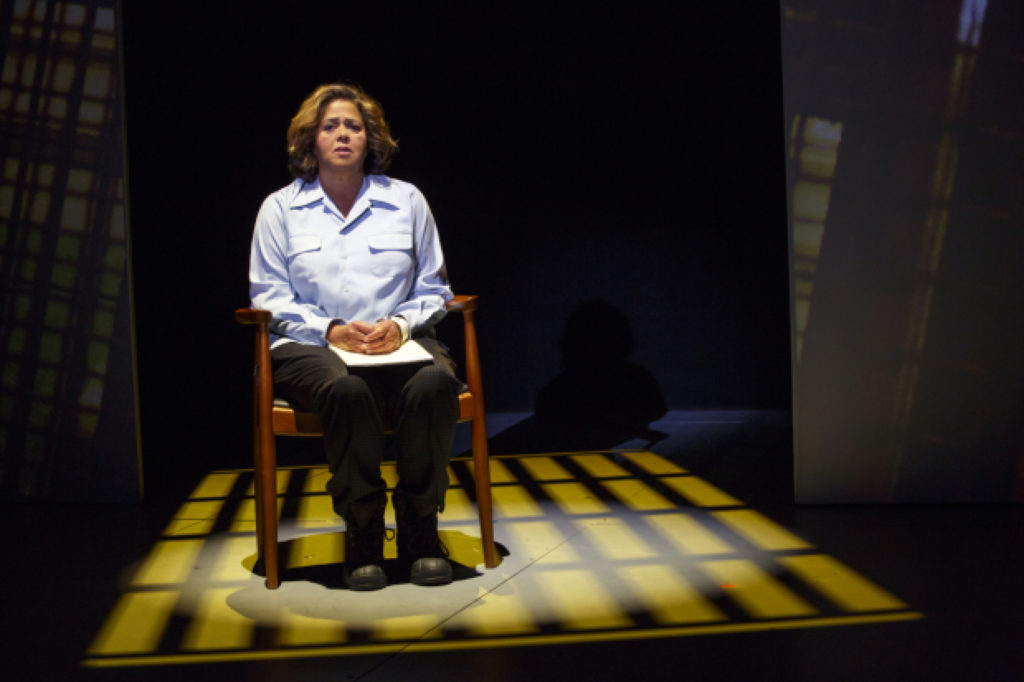
Anna Deavere Smith performs Notes from the Field.
She interviewed 250 people about the criminal justice system and its impact on individual lives and on the community. The play was first performed in 2015, and ran at the Second Stage in New York last fall to rave reviews. It is running again this week on HBO, as protests take place in every state in the union to protest the murder of George Floyd at the hands of a police officer in Minneapolis.
In a time of such national turmoil and division in the US, who better to help us make sense of it?
our 2017 interview with Anna Deavere Smith
In late September 2017, on a perfect LA afternoon, we sat down with Anna at the swanky Blvd Restaurant at the Beverly Wilshire hotel in Beverly Hills (she was in Hollywood shooting a new Shonda Rhimes show for ABC Television).

BLVD Restaurant at the Beverly Wilshire Hotel, LA. Courtesy Photo.
When we arrive at the restaurant, she’s already been seated, looking California-chic in a white pantsuit, turquoise blouse, and silver jewelry. She’s drinking an iced espresso, and we request an iced tea. A lively discussion ensues. (During the course of the conversation, we learn that the Beverly Wilshire hotel is one of the many places that Anna visited over 25 years ago while conducting interviews for Twilight: Los Angeles 1992 – the concierge at the time had several stories to share. She has come full circle. Learning this gives us goosebumps).
the genesis of Notes from the Field
We start by asking about the genesis of Notes from the Field. She responds: “I’ve been on a journey, having been a teacher in these luxurious schools – Stanford, NYU. Teaching ‘fancy,’ privileged people.
Notes from the Field is about the opposite. It’s about kids who don’t get through school. Black and brown kids are far more likely to be suspended than other kids when they are in middle and high school. And statistically, once you have 3 suspensions, you’re likely to be imprisoned.
My mom was a teacher – she had a graduate degree. My aunts were teachers, too – back then, black women with education were mostly either teachers or nurses. I saw these women changing people’s lives. The children they taught were their projects. It’s so much harder now for schools to be a place where kids can find joy and wonder. That’s what I try to generate in my classroom as a professor: questions, doubt, curiosity, joy and wonder.
a journey across America
So I went on a journey to go back home. I visited four geographic areas: Stockton, California; a Native American reservation in northern California; Baltimore; Philadelphia; and South Carolina. In every place, I found people making a difference with very few resources.”
lessons from the Yurok
A couple of years on, we wonder which of the many experiences she had doing this research still remained top of mind for her, and it’s clear that her time with the Yurok Tribe on the north coast of California was deeply meaningful.
“Getting close to Native Americans was an incredible experience. They have a genuine sense of dignity, and their stories belong to them. So many things have been taken from them. I’m the “Minister of Words,” but who am I to try to tell their stories?
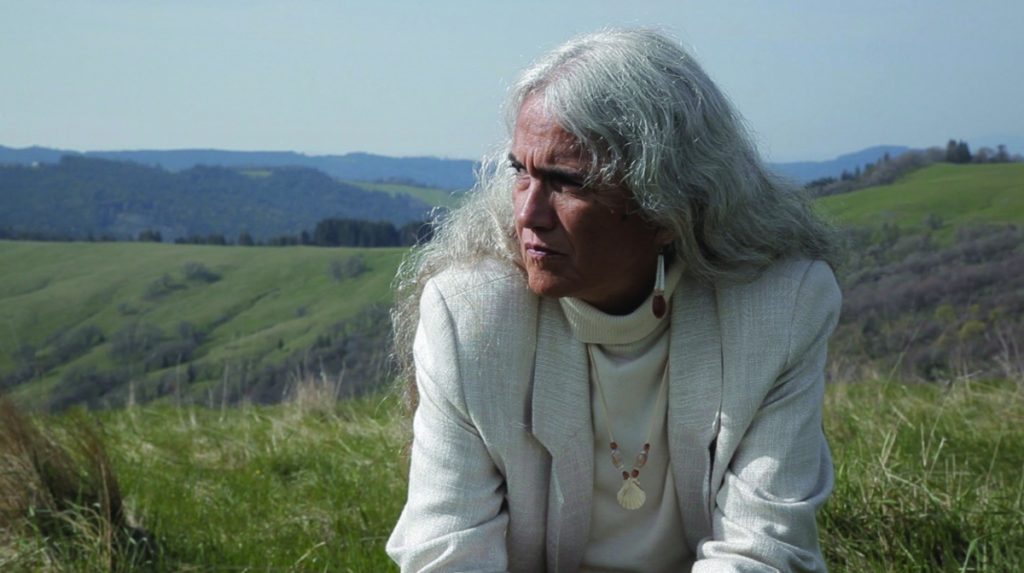
Notes from our interview with Anna Deavere Smith about race in America: The Honorable Abby Abinanti. Photo Credit: International Documentary Association.
The Honorable Abby Abinanti is the Chief Judge of the tribe. She opened doors for me, took me to the tribal dances. They are a river tribe – a fishing tribe – and she told me ‘you belong by the river.’ Meaning: ‘you are welcome here.’ That was such a gift.”
a return to Baltimore
No stranger to difficult and dangerous places, we’re curious about whether Anna is ever afraid when she’s doing her research.
She’s candid in her assessment: “There were times doing this research when I was afraid. Baltimore is my home town and there were times I was terrified there. We couldn’t walk through the streets that I used to walk on when I was little and my aunt would look down the block after me as I went to the store. People we were interviewing there said ‘you guys need to be careful.’”

Notes from our interview with Anna Deavere Smith on race in America: Baltimore’s Inner Harbor.
“The good thing,” she continues, “Is that there’s almost always someone who will reach out to help. Like when I was working on the Rodney King play and I was doing research all over LA. Like I mean, everywhere. I went to the home of Angelica Houston. I interviewed Charlton Heston. Talked to Darryl Gates, to several police officers, to some members of the jury. I remember when we went to South Central to visit Nickerson Gardens. We were walking down the street, and an older gentleman said ‘What are you all doing here?’ Then he said ‘Let me walk with you.’ He wanted to keep us safe.”
a play debuts in 2016 as the nation takes a turn
A lot has changed in America since Anna launched the research for Notes from the Field in 2014. We wonder if the audience reception for the play evolved during the course of its run.
“I finished my work in early 2016, and I was performing the play at Second Stage in New York both before and after the Presidential election in the fall of that year. The difference in the audience was palpable after the election. People seemed to really need to be there. I could feel their urgency, and it made me feel that these audiences must really want to live in a country where people are not left out. That was promising.” The play’s run was extended in New York for several weeks, due to overwhelming demand.
is there reason to hope?
To sit with Anna for any length of time is to experience the full force of her passion and energy for social justice. Given all that’s going on in the world, we ask if she feels discouraged in any way. What do recent events tell her about the heart of America?
Her response is inspiring: “I have so much excitement. I’ve interviewed thousands of people, and even in prison you’re going to find somebody who is a lover of human beings. There will be someone who is willing to walk with the fallen. Who gets them, and who wants to help them.”
“This is a dark time,” she continues. “And also a great time. Because you see people fighting for democracy.
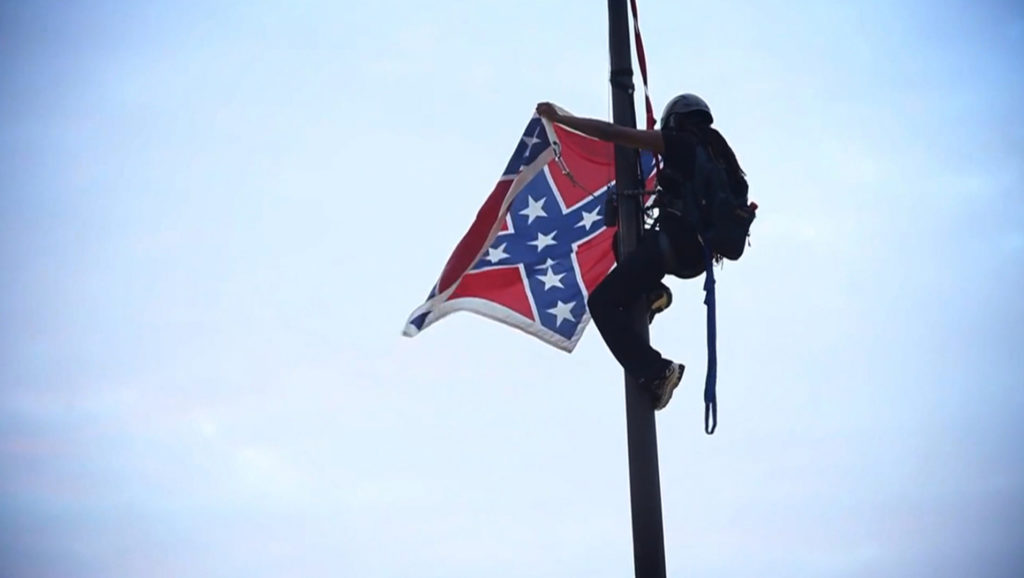
Notes from our interview with Anna Deavere Smith on race in America. Bree Newsome climbing at the South Carolina Capitol building in order to remove the Confederate flag. Photo Credit: Vanity Fair.
In Notes from the Field, we show a film clip of Bree Newsome. She’s the young woman who climbed the flagpole to take the Confederate battle flag down from the grounds of the South Carolina statehouse. She has this huge smile on her face, even as she is being escorted away by law enforcement. She had never climbed anything in her life. I think that’s a show of love. She was saying to the world, ‘I’ll risk my life to say that this symbol of hate cannot prevail.’”
The Hidden Hate, Hidden Love Project
Anna’s latest project builds explicitly on this theme. It’s called the Hidden Hate, Hidden Love Project.
She explains: “What’s coming out right now feels to a lot of people like hidden hate. Like maybe they knew it was there, but they didn’t know how much of it was there.
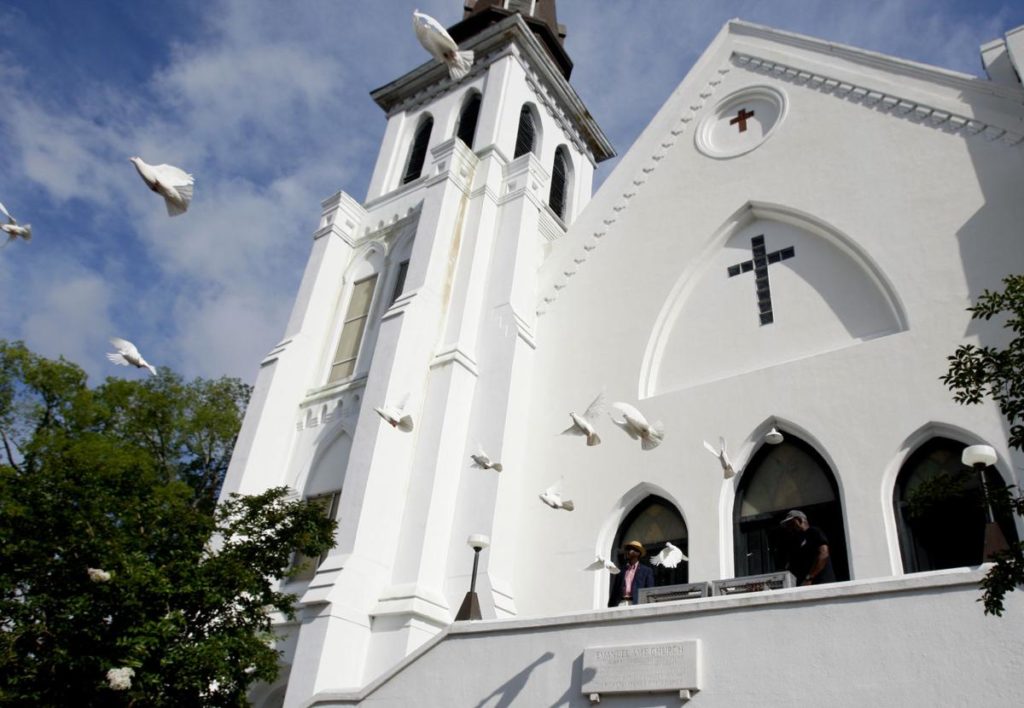
Notes from our interview with Anna Deavere Smith on race in America: Mother Emmanuel AME Church in Charleston, South Carolina. Courtesy Photo.
But where there’s hidden hate, there’s also hidden love. We need to look for it and bring it forward. Several times I have been to Mother Emmanuel church in Charleston, the site of the race-based massacre of a black minister and several black parishioners by a young white man. Every time I am there, they ask visitors to stand up and be recognized. Last time I was there, a huge group from Park Avenue Synagogue in Manhattan were visiting to show their solidarity with the congregation. That’s love.”
a call to action
As always with this artist, these are not just words, they’re a call to action. “I have the luxury of thinking about this, and I am issuing a call for artists to bring this idea to life. On my website, annadeaveresmith.org, there’s a link to the NYU Institute on the Arts and Civic Dialogue.
She continues: “This fall we are asking for submissions from artists in all genres to express ways in which hidden hate and hidden love are made visible.” Plays, film, poetry, fiction, essays, music, dance and visual art are all welcome. Submissions are due on October 13th. Invited artists will present their work at a one-day event open to the public in New York in the coming months. #HiddenHateHiddenLove.
final notes from our interview with Anna Deavere Smith
It’s fitting to end our own notes from the field on the hopeful note – and also the personal challenge – upon which Anna concluded our chat.
“If hate can be announced so loudly, how much louder do we need to be in announcing acts of generosity and compassion? I was a child when Martin Luther King, Jr. first started his civil rights work. I was in college when he was killed. For my entire life, I have been searching for the American character. I’ve interviewed thousands of people, and I think it’s in the DNA of our country that people want to strive for a more perfect union. And even dissent is a part of that search.”
join our community
For access to insider ideas and information on the world of luxury, sign up for our Dandelion Chandelier Newsletter here. And see luxury in a new light.
Join our community
For access to insider ideas and information on the world of luxury, sign up for our Dandelion Chandelier newsletter. And see luxury in a new light.



